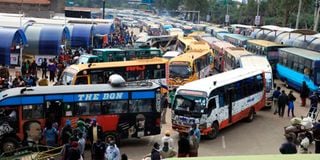Premium
Address matatu issue with finality

PSV vehicles and passengers at Green Park terminus during a test run on June 18, 2021 conducted by Nairobi Metropolitan Services.
For the umpteenth time, the authorities have announced a ban on matatus in Nairobi city centre. The latest deadline is supposed to be end of this month but I can bet my last ndururu that, like previous deadlines, it will quietly pass without enforcement.
The fact is that directives such as those will be fiercely resisted by matatu operators as well as commuters who would be greatly inconvenienced having to trek long distances between the central business district and outlying termini.
Now, walking is not bad. It can work wonders in energising otherwise sedentary creatures. However, nobody wants to reach work sweaty and dusty every morning. Also, no thought has been given to what will happen as the clouds start to darken. And for those leaving town late, it should be a great concern that muggers, bag snatchers and the other criminal elements that rule the streets after dusk will be in big business.
The uproar, especially in a general election year, will force Transport Cabinet Secretary James Macharia and Nairobi Metropolitan Services (NMS) Director-General Mohamed Badi to beat a hasty retreat.
Thoughtless directives provide a clear illustration of the poverty of ideas in a critical area. It’s true that matatus are a menace in the heart of the CBD. They have turned entire streets east of Moi Avenue into messy gridlocks.
Clear solutions
This is a problem that must be tackled urgently—and ruthlessly — if need be. But the simplistic prescription was mooted during the tenures of successive mayors of the capital city over a decade from 2003 to 2013, as well as its past governors, Dr Evans Kidero and Mike Sonko, from 2013 to 2020.
The regime of wallflower Governor Ann Kananu, who took over after Mr Sonko’s impeachment, and Lt-Gen Badi, who assumed overall power on key dockets after formation of the NMS, can surely do better than float policies that have been previously tried and abandoned.
The proposed matatu ban provides evidence that Gen Badi, CS Macharia and their armies of experts, advisers and flunkies have never read various reports published over the past two decades offering detailed analyses and clear solutions on the movement of people and goods within, into and out of the city.
What is needed is not knee-jerk reactions but establishment of efficient mass commuter transport systems. They are proposing, for instance, that once matatus are restricted to the edges of the CBD, commuters will complete the rest of the journey on modern buses.
Mythical BRT
So where are those buses to be deployed into service at the beginning of next month? They will prove as mythical as those Bus Rapid Transit (BRT) vehicles that Mr Macharia has been promising since time immemorial, when he made a great show of painting pink lines on Thika Superhighway to indicate the reserved bus lanes. The ‘lipstick’ has since faded.
For the immediate solution, what is needed is not a matatu ban in the city centre but on parking. Matatus should drop off and pick up passengers on designated stops and drive out with minimum stoppage time.
In the longer term, there is an urgent need for regulated, clean, predictable and disciplined commuter transport services comprising a mix of boda boda, matatus, franchised high-capacity buses, trams, light rail and commuter trains.
The blueprints and master plans already exist in abundance. They emphasise a system that will ease traffic congestion by encouraging a shift from largely single-passenger private cars to a working public transport system like other modern metropolises.
* * *
The weekend attack on Opposition leader Raila Odinga’s entourage in Uasin Gishu was both outrageous and frightening. The goons who damaged his helicopter with a hail of stones and any planners and paymasters, however high and mighty, must be arrested and arraigned for the crime.
Deputy President William Ruto put on a class act by disowning the lawless mobs and publicly apologising to Mr Odinga, his main foe at the August 9 presidential election. The apology indicates that he takes responsibility for the actions of his lieutenants. It follows that he will not cry foul if politicians close to him are arrested over the incident—as he is so wont to do any time suspected criminals seek shelter under his skirt.
But that will depend a great deal on the Directorate of Criminal Investigations carrying out competent and impartial investigations rather than the political hatchet jobs that give rise to complaints.
Let us also hope that Mr Odinga’s mouthpieces will resist undue celebration of the political capital and allow the criminal justice system to handle the matter and the law to take its full course.
[email protected]. www.gaitho.co.ke @MachariaGaitho





